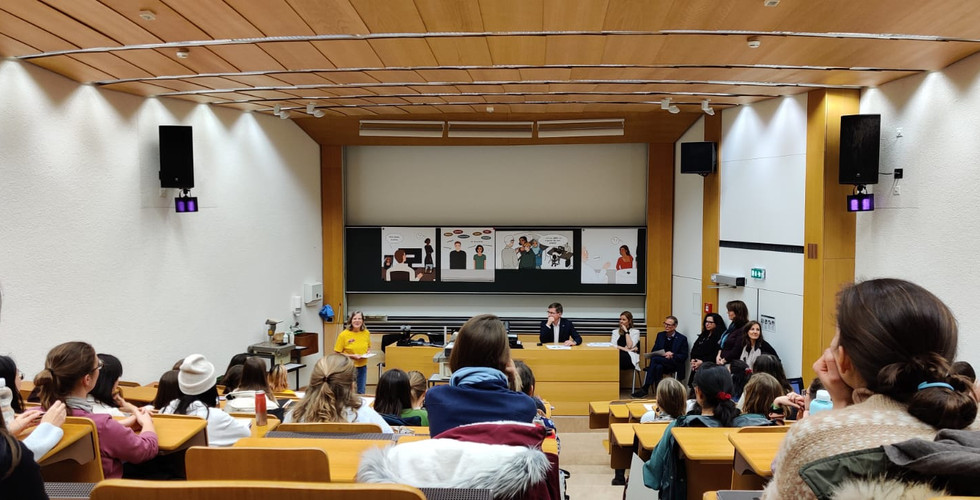ETH President meets Doctoral Students
- 500wszurich

- Feb 6, 2023
- 3 min read
Updated: Feb 7, 2023
More than 50 female doctoral students met with Joël Mesot and members of the Executive Board on January 25th to share testimonies about the challenges they face in their day-to-day activities and to recommend measures for preventing, monitoring, and holding individuals accountable for inappropriate and disrespectful behavior at ETH.
An event organized by 500 Women Scientists Zurich last November used stories shared by female doctoral candidates on an anonymous padlet as the basis for a series of cartoons highlighting that sexism, harassment, and micro-aggressions are still common at ETH.

Concerns raised
The event with the Executive Board on January 25th opened with short welcome statements by Darcy Molnar, coordinator of 500 WS Zurich, and Joël Mesot. These were followed by testimonies that had been prepared in advance by four ETH doctoral candidates. Each testimony highlighted personal experiences at ETH and gave clear recommendations for actions ETH could take to improve the working environment for all. The first doctoral student concluded that abuses will continue unless ETH ensures that there are dire consequences for those who mistreat students and that ETH’s reputation is at risk if actions are not taken. The second individual highlighted that there is no reward for moral integrity in the system at ETH and urged the Board to give high priority to the correct monitoring of unethical behavior. She ended her statement with the following message to the Board “Consistently, highly questionable situations are known but kept behind closed doors. You have the position and power to change this system. A system that currently tolerates discrimination and harassment due to inaction and undefined consequences.” The president of WiNS (The Society for Women in Natural Sciences at ETH) gave a third testimony and underlined that WiNS would be happy to support ETH in developing a new strategy for equality, inclusion, and diversity (EDI). WiNS has prepared an open letter outlining suggested infrastructural changes to create a more nurturing workspace for everyone. The letter has been endorsed by WiNS, 500WS Zurich, LIMES, TWIST Basel, and staff associations of the physics and biology departments. The fourth testimony mentioned that according to ETH, any form of bullying, harassment, discrimination, or threats and violence will not be tolerated and can result in disciplinary actions (see ETH Code of Conduct). And yet, it is unclear exactly what those disciplinary actions are and which actions will be applied to each situation. She ended with the
statement, “You need to realize that the current system forces us, victims of harassment and bullying, to give up on our lifelong dreams of doing impactful research just to have our basic rights not infringed! To alleviate this, we urge you to have those disciplinary measures clearly defined and explicit, to help us, those going through these situations, to have more hope and courage to put ourselves out there non-anonymously.”
Discussion with the ETH Board
After the testimonies, Joël Mesot thanked the speakers for their courage. He then outlined ETH's activities in the last years, including leadership programs, bias training, Respect campaigns, and promoting female representation. He also confirmed that contrary to some years ago, ETH now collects data on doctoral candidates’ reasons for dropping out of their programs.
A doctoral student spoke up to emphasize that more monitoring is needed and that the measures ETH is taking should be made more visible and transparent. The need for anonymous reporting was also identified. Due to the strongly hierarchical system in academia, where doctoral students’ professional futures are dependent on their supervisor’s approval, students often remain silent when faced with micro-aggressions or harassment. An anonymous reporting system, such as the one established by Cambridge University, should be adopted to free individuals experiencing harassment from the burden associated with formal reporting. Julia Dannath, VP of Personnel Development and Leadership, stated that ETH is developing an anonymous initiative that should be ready for use by March or April.
In Summary
The meeting with the Executive Board highlighted that much work still remains to be done to improve the work environment for all doctoral candidates at ETH. The concerns raised by the doctoral students at the meeting were echoed in a recent NZZ article titled “Die ETH und ihre Frauen: warum sich der Alltag im Labor nicht an die Diversity-Pläne der Schulleitung hält.” The negative experiences faced by doctoral candidates interfere with their education, their ability to contribute to research at ETH Zurich, and their professional development. Such instances of discrimination and harassment have been identified by the Swiss Academies of Arts and Sciences as violations of scientific integrity for which there is no room at ETH Zurich.











Comments